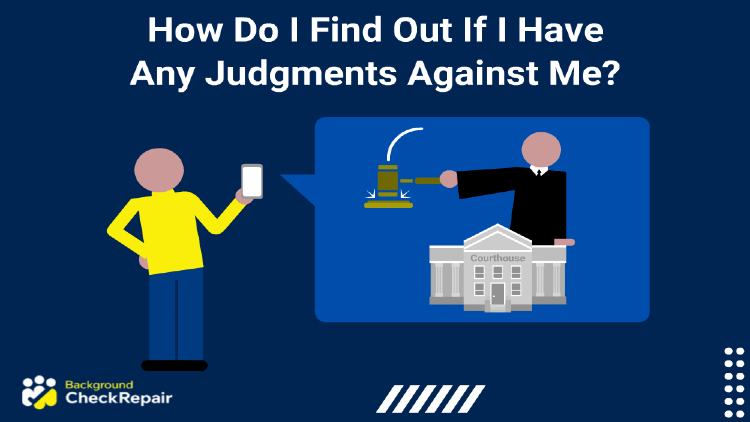How Do I Look Up Judgments Against Yourself Free?
Judgments can be found for free or mostly free on most state court websites. Simply utilize the case search function that is commonly available to search for judgments.
 Written by Background Check Repair
Written by Background Check Repair
Background Checks | February 19, 2026

Table of Contents
Individuals, who have outstanding debts may be wondering, How do I find out if I have any judgments against me?
A judgment filed against someone can have long-term and serious impacts on their finances, so knowing where to look to find them (in case the official notice was misdirected or lost) can be a real help in having the judgement resolved.
Being able to search for judgments among official court records is the first step.
This guide explains all the methods that can be employed to:
A judgment is a court statement that gives a creditor the legal right to pursue a debt that they are owed, through various methods. Most often these methods involve seizing certain assets, such as a portion of the individual’s wages, and certain property.
Although this can sound scary, keep in mind that there is a legal process involved so individuals with outstanding debts will be given plenty of notice and will be requested to appear in court in order to defend their lack of debt repayment.
A judgment happens only when the creditor wins the court case, or the individual fails to show up for court at all.
Knowing the answer to “how do I find out if I have any judgments against me?” is the first step in the lengthy process of repaying the debt that is owed. In general, there are three main ways to learn whether or not there has been a judgment made against you.
When an individual fails to repay a debt, the creditor can file charges (lawsuit) for the money that is owed. The amount the creditor may sue for also includes other things like attorney fees as well as interest, often making the final amount much higher than what was initially owed to the creditor.
When the creditor decides to sue, the individual will receive a request to appear in court where they can plead their case in front of a judge. Although simply not having enough money to repay the debt is a reason that the judge will consider, there will usually need to be other circumstances to avoid receiving a judgment.
Assuming the judge deems that the debt needs to be repaid, the individual will have a judgment made against them, the terms of which will be explained by the judge. In situations in which the individual who is being sued appears in court and a judgment is made, they will learn about the judgment directly from the judge who heard the case.
Direct contact also applies if someone does not appear in court. The court will send registered mail providing notice of the judgment to the person’s home address. This is the most common way judgment notification is conducted.
However, if the person fails to appear in court, and the mail goes undelivered, there’s no direct contact method for learning about a judgment.
In this case, individuals still have a few options to answer the question of “How do I find out if I have any judgments against me?”
One of the easiest ways to find judgments is through the court where the case was heard. Individuals who are aware of the court date and location will be able to find this information easily, and they can simply contact the court directly.
The quickest way to obtain the documents by phone is to give the court clerk the case number, which should be included in the initial mail that requests the individual appear in court. If the case number is not known, the name of the individual in question should be sufficient to find the proper documents.
Keep in mind that requesting court documents this way usually carries a small fee.
The last resort is to find out about a judgment online. This is the least ideal method for a few reasons.
Although most do, not all courts have online systems with court documents, so individuals may still have to contact courts directly to obtain certain documents. Individuals who’ve misplaced the mail may not know which court heard the case and therefore must contact several courts or several online sources to check multiple courts manually.

To perform a manual search, both state and local courts can be accessed online in the following steps:
Step 1: Access the State Court Website
The first step is to locate the state court website. A simple Google search of “State Court” should yield the website. In some cases, this website will be through the state court system directly, or a website dedicated to the entire state government.
For example, to find the state court case search for the state of Delaware, individuals will first need to access the Delaware Courts website.
Step 2: Access the Online State Court Case Search
Every state court website will have information on what documents are available and the best way to obtain them. In most cases, the website will direct users to an offsite platform website where individuals can access court documents for all cases heard at the state level.
Keep in mind that for many of these databases, only state-level court case information can be found. Federal cases are searched in the PACER system. Cases that were heard in local courts will need to be accessed through that court directly. In other cases, the state website will have local court documents for certain counties but not others.
To find the court case search look for terms like:
Different terms are used for each state but they will usually be some variation of the above, utilizing the website’s search function is often the fastest way to find it.
For example in Delaware, the Delaware Court website home screen has a link to the Delaware Court Civil Case Search. This database is maintained through a third-party website called Court Connect.
Step 3: Perform Search
Once the search function has been found, it is as simple as following the specific steps to complete the search.
For example, in Delaware the Court Connect system allows individuals to select their search method from a few different options. In most cases, searching by the name of the individual is the best approach if the case number is not known.
After selecting that option, individuals will be taken to a simple online form where they can enter as much information as possible to obtain results.
Keep in mind that many state court search systems will require a small fee, which is usually less than $5 per search.
Links to the state court website for each state are listed below.
Although most judgments are filed at the state level, in some situations a judgment may be filed at a local court. In this case, the answer to “How do I find out if I have any judgments against me?” will vary based on the county.
As mentioned, some counties will not have digitized records, in this case, individuals will need to contact the county court clerk directly to learn how to obtain documents. Remember, all court records (with a few exceptions like sealed juvenile records) are considered public information, so obtaining the documents shouldn’t be a problem.
For counties that do have online records, the process is very similar to obtaining state court documents.
Step 1: Access the County Court Clerk’s Website
The first step is to access the website for the county court clerk. In some cases, this will be on the website for the county court, but many clerks will have a website specifically dedicated to the clerk.
For example, in Franklin County, Ohio a google search of “Franklin County Court Clerk” will yield the Franklin County Municipal Court Clerk website.
Step 2: Access the Case Search
The county court clerk’s website will usually make it clear if there is an online case search that can be used to find court documents or if records requests need to be made directly. If a case search is available, this is the far easier and more convenient option
For example, the Franklin County Municipal Court website has a link to “Search Records,” on the website homepage.
Step 3: Perform Search
Once the case search has been accessed, simply follow the instructions provided to perform a search. In most cases, the case number will be the best way to perform a search, however, if the case number is not known, entering the individual’s first and last name should yield any results.
For example, the Franklin County court case search allows individuals to search by name, case number, business name, and date.
Keep in mind that in many cases a fee will be required to perform a search, or to obtain the results.
After a judgment is entered, several different things happen. The first is that the individual will be notified of the judgment, usually by mail. After this, the creditor will have several options to obtain the money that is owed.
Certain assets are protected by law, such as the individual’s home, clothing, and other basic necessities. However some property is not protected and the creditor may choose to seize any and all assets that they are allowed, in order to recoup the money that is owed.
Generally, the items being seized will be given a monetary value and that will contribute to repaying the debt. This is known as a property levy.

Asset seizure is just one of the methods that creditors can use, in some cases the individuals will have bank accounts frozen or quite often will have a portion of their wages taken (garnished) by the creditor. Property liens are also a common method used by creditors.
The best thing to do if a judgment has been entered against you is to contact an attorney who will have a better understanding of the laws and options.
Once a judgment has been entered against an individual, the creditor can use various legal means to gain access to an individual’s bank accounts. These are provided by the justice system using IRS records etc.
Creditors are able to freeze the accounts to avoid any money from going in or out of the account and in some (rare) cases, are even given authority to take money directly out of the account.
Civil judgments do not show up on credit reports, however, ones that are related to debts may show up. However, a judgment may be reported to a credit bureau by the creditor, if that creditor has been awarded the debt collection.
Judgments can show up on an employment background check, however, it is somewhat unlikely. In most states, there are no laws that dictate if judgments can show up on background checks, however many pre-employment background screenings, such as a typical background check for an entry-level job, simply won’t perform this kind of check.
Most employers use background check services to perform background checks on applicants and will usually pay for each kind of check, so most don’t feel the need to check an applicant’s credit information.
However, higher-paying jobs and those that will give the applicant access to sensitive financial information will likely perform this check. In some cases, this information may not be allowed to be reported due to how far back state background check laws are allowed to look, so it’s worth it to check local county and state laws to be certain.
Creditors must file a judgment within 3 years of the debt not being paid. Once the judgment has been filed, state laws will determine the statute of limitations on the judgments.

This is usually at least 5 years and in some cases can be as many as 12 years. Even in states that have a lower amount of time for the creditor to collect, the debt collection agency is often able to refile the judgment, making the time essentially indefinite.
Judgments will never be intentionally filed without the knowledge of the individual. Just like with most criminal charges, individuals who have a judgment filed against them will be notified to appear in court to defend themselves and be notified of the judgment.
Both of these notifications are usually made by mail.
Knowing how to answer the question of “How do I find out if I have any judgments against me?” will make the process much smoother so that individuals can take the next step in repaying or disputing the debt.
Judgments can be found for free or mostly free on most state court websites. Simply utilize the case search function that is commonly available to search for judgments.
Using the state court case search is the best way to search for judgments when the individual has no idea one has been filed. If an individual was requested to appear in court about a judgment, contacting that court directly is often the best method.
Judgments can show up on some criminal background checks. However, in most cases, the person performing the check will have to search for any judgments directly.
It’s also wise to check for dismissed charges that appear in case the original judgement was related to a criminal charge that didn’t result in conviction.
The PACER system only contains information on federal court cases. Since most judgments are made at the state or local level, it is unlikely that the PACER system will have this information.
No, a judgment simply means that a court decided that the individual violated the law by not repaying their debts and the debt collection agency has the right to attempt to obtain that debt from the individual. In some cases, individuals may declare bankruptcy as a result of the judgment, which allows them to liquidize their assets.
Not being able to afford to pay a judgment will result in the debt collection agency obtaining the power to seize as many assets as necessary, as well as wages. If this still does not cover the cost that is owed, the individual could potentially face jail time.
A renter’s background screening is unlikely to show judgements unless they are included on the credit report. In these cases, picking an apartment that run background investigations may be required.
We use cookies to ensure that we give you the best experience on our website. If you continue to use this site we will assume that you are happy with it